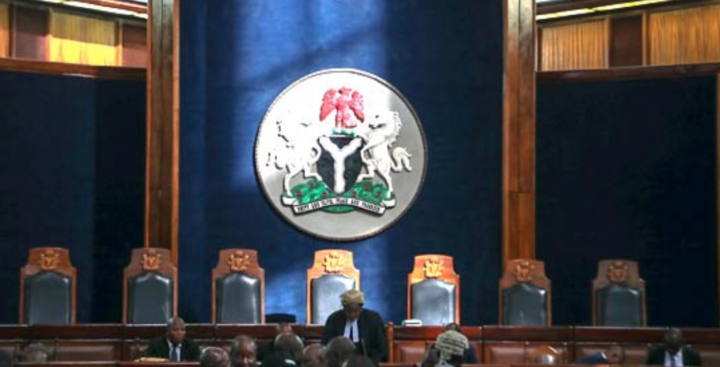Over the past fortnight, this column has addressed the multiple dimensions of the crises of attrition, retention, and replacement in Nigeria’s Supreme Court as well as the pathologies that make these resilient. Given the significance of the Court in the country, it is only proper to dwell a little on how these problems can be fixed. Three issues are immediately in focus.
One is occupational health and well-being for Supreme Court Justices. The tendency to reduce the triple crises of attrition, retention, and replacement in Nigeria’s Supreme Court to an issue of appointment of brilliant academics or supposedly proven practitioners avoids the real problem. Indeed, the records suggest that premature mortality on the court has been most unkind to its brightest and best.
For instance, Chukwunweike Idigbe was reputed to be arguably the sharpest and most rigorous mind on the court at his death in 1983. Augustine Nnamani was only the fourth holder of a doctorate degree in law to be appointed to the court, after Taslim Elias, George Baptist Ayodola Coker, and Egbert Udo Udoma; and Okay Achike was only the second law professor and the third legal academic to sit on the Supreme Court after Taslim Elias. Adolphus Godwin Karibi-Whyte, another academic who preceded him to the Supreme Court and who, like Achike, retired in 2002, was an Associate Professor at the University of Lagos before the onset of his judicial career. Niki Tobi, former Dean of Law at the University of Maiduguri, followed later.
The Supreme Court does not appear to have been the kindest of working environments its most brilliant minds and there is nothing to say that it will be kinder to any bright minds who agree to go there now. If anything, the court has been somewhat of a cemetery in a quite literal manner to the brightest legal minds.
Advertisement
The complaint of the BOSAN about its members being denied elevation to the Supreme Court deserves to be treated with suspicion. Regrettably, it is also members of the BOSAN who saddle the court quite often with applications of the most disreputable kind, needlessly clogging up the dockets of the court and making the work of the Justices unbearable. The BOSAN can hardly complain when Justices of the same Supreme Court look upon many of these same practitioners of dubious professional ethics with determined suspicion when they look prey with the intent on the high judicial office.
A major problem with the court is not merely that its dockets are unmanageable, it is also that, secondly, its working methods appear inhumane and unsuited to its primary workers, who are by design senior citizens. In June 2022, it emerged that the Justices of the Supreme Court had written to the then CJN complaining of debilitating failures of health and wellbeing, including non-provision of housing and research assistants. In particular, their letter lamented that there had been no meeting of the Justices over the entire duration of the COVID-19 crisis, pointing out that the standard of healthcare in the court had deteriorated to the point where “there is a general lack of concern for Justices who require immediate or emergency medical intervention.” These complaints naturally raise the possibility that the rate of mortality as a form of attrition at the Supreme Court is preventable.
This naturally leads to the third issue of leadership of the Court. Historical mortality may be relatively high among appointees to Nigeria’s Supreme Court but it has never affected any CJN. This is surprising because many will think that the CJN, with the multiple portfolios and offices that s/he holds, would be very stressed. Over the years, the office has evolved from being a first among equals to a bit of a constitutional potentate, with an infinite capacity to dispense patronage or penury in equal measure at their whim around the legal profession. Any reform of the court that does not address the urgent need to un-bundle the office of the Chief Justice is fated to fail.
Advertisement
It is no surprise, therefore, that recent occupants of the office appear to have been undone by allegations on the borders of judicial integrity. In three years since 2019, Nigeria has had three Chief Justices. Of these three, two left office prematurely in circumstances connected with negative imputations on judicial independence and integrity. Indeed, it has been said that the penultimate CJN left the judiciary and the Supreme Court “in a mess”. About the sack of his predecessor, The Economist wrote that it was “not merely unusual; it was also unlawful.” In that case, it appeared the judiciary was wilfully complicit in its own defenestration, itself also evidence of deeper integrity problems with that branch of government.
When legitimate questions of judicial integrity can be raised at this level, it becomes rather idle to focus on access to appointments as a panacea because even the appointment process would be corruptible and probably corrupted. In the public perception, this is largely what the current situation is with judicial appointments in Nigeria. Many believe – and there seems to be evidence to support the claim – that appointments have become a joint enterprise of politicians and judicial insiders. When BOSAN complains that its members deserve a look in, citizens sneer that BOSAN’smembers desire to muscle in on this duopoly with hardly any altruistic goals in view.
These are by far the biggest causes of the attrition, retention and replacement crises in the Supreme Court. As is evident from this breakdown, appointment or replacement does not necessarily rank among them. Indeed, in the face of these, the problem that Chief Justice Ariwoola complains of cannot be altered even if we were to triple the establishment size of the court from 21 to 63 or, even worse, implement the entirely unfortunate and unworkable idea of decentralizing the Supreme Court to each geo-political zone of the country as some have advocated. In these circumstances also, legislating for Justices to serve until the day after an eternity, as Afe Babalola SAN has suggested, would be a very bad idea indeed.
It is nevertheless important not to totally ignore the advocacy by BOSAN to look to the ranks of its members for appointments to the Supreme Court. Former CJN, Mohammed Lawal Uwais, has explained that he instituted the policy of confining Supreme Court preferments to serving Justices of Appeal because “there is the issue of integrity. If you have been a judge at the High Court or Court of Appeal before coming to the Supreme Court, you would have done cases where whether you are a corrupt person would have been discovered.”
Advertisement
It should be recalled that the Chief Justice governs preferment to the privilege of SAN. If he says that he is unable to trust the integrity of the persons whom they choose to refer to the rank, then it is hardly a response to the crisis of appointment in the Supreme Court to suggest that the answer lies in choosing from the ranks of persons whose integrity can’t be guaranteed. What is required in the face of this claim is not to insist on preferring people to the Supreme Court from these ranks but to first reform the system of preferment in order to guarantee the rank of SAN as a quality mark of unquestionable integrity and excellence, which it can hardly be said to be present.
In the end, it is necessary to admit that there is no magic bullet to address or resolve the crises that the new CJN has called attention to. Rather it requires a multi-dimensional approach beginning with an internal reform of the operations and management of the Supreme Court itself to improve the well-being of its personnel both judicial and non-judicial. Caseloads in the court will need to be governed much better through appropriate filtration devices. This will require a combination of both legislation and reform of the rules and doctrines of the court. Standards of judicial ethics at all levels will need improving. If these are done, then attention to appointments could be part of the package. Absent these reforms as a package, a focus only on appointments will not be part of the solution. Rather, it will only deepen the problem.
A lawyer and a teacher, Odinkalu can be reached at [email protected]
Advertisement







